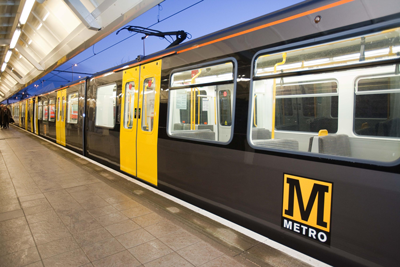NECA agrees strategy to improve Metro and local rail in North East England
- Like
- Digg
- Del
- Tumblr
- VKontakte
- Buffer
- Love This
- Odnoklassniki
- Meneame
- Blogger
- Amazon
- Yahoo Mail
- Gmail
- AOL
- Newsvine
- HackerNews
- Evernote
- MySpace
- Mail.ru
- Viadeo
- Line
- Comments
- Yummly
- SMS
- Viber
- Telegram
- Subscribe
- Skype
- Facebook Messenger
- Kakao
- LiveJournal
- Yammer
- Edgar
- Fintel
- Mix
- Instapaper
- Copy Link
Posted: 22 July 2016 | Katie Sadler, Digital Content Producer, Intelligent Transport | No comments yet
The North East Combined Authority has agreed a Metro and Local Rail Strategy designed to improve passenger journeys and kick-start the expansion of local rail in North East England.


Image: NECA
The North East Combined Authority has agreed a Metro and Local Rail Strategy designed to improve passenger journeys and kick-start the expansion of local rail in North East England.


Image: NECA
The devised Metro and Local Rail Strategy identifies a network of disused or under-used rail routes across North East England which could benefit from new or better services. In addition, the Strategy set out the case for more than £1bn of new investment in the existing Tyne and Wear Metro system over the next 20 years.
£1bn investment in existing Metro system over the next 20 years
Commenting on the strategy, Cllr Nick Forbes, lead member for Transport on the North East Combined Authority and leader of Newcastle City Council, said: “We have approved an ambitious strategy for expansion of local rail across our region, tied in with continued investment, development and expansion of the iconic and world-famous Metro system.
“We have approved an ambitious strategy for expansion of local rail across our region”
“We are building a business case for major investment in Metro and local rail to improve journeys for passengers and provide cleaner, greener and attractive travel choices.
“Local rail brings huge economic and social benefits to the communities it reaches today but we need to extend those benefits into new areas. To do that it is essential we secure funding for a new fleet of Metro trains, acting as a catalyst for the expansion of local rail and better integration across North East England.
“The well-publicised problems with train reliability on Metro underline how essential it is to bring in a new train fleet. But we want to look far beyond that immediate goal, to make the most of the greater possibilities to grow all local rail services together as part of the Combined Authority’s Our Journey manifesto for transport in the North East.”
Strategy proposes to bring back to life little-used rail routes in North East England
The Strategy put forward the possibility to bring back to life little-used rail routes in the region for passenger service, providing a starting point for detailed evaluation to see which might deliver the highest benefits from investment and what the construction challenges would be. It also identifies routes where passenger services could be increased, routes currently used for freight traffic only and some where the track has been pulled up but the alignment still exists.
Furthermore, the Strategy links expansion of local rail with investment in a new Metro fleet. Modern metro trains will be able to operate more widely and beyond its traditional electrified system, serve alongside regional passenger services.
New Metro fleet by early 2020s
It details the case for new Metro trains to replace the original fleet in service since 1980, at an estimated cost of £550m including power supply upgrades and new depot facilities, with a target date for a new fleet to be introduced in the early 2020s.
Nexus, which owns and manages Metro, has begun talks with the Government about funding routes and will submit a detailed business case before the end of this year.
“Local rail corridors can be combined with Metro to create a single network at a lower cost than new-build railways”
Tobyn Hughes, Managing Director for Transport at the Combined Authority, said: “We believe some existing and disused local rail corridors can be combined with Metro to create a single network at a lower cost than new-build railways. By fusing local rail and Metro together we can create something new and better than the sum of those two parts.
“There are also areas where the existing Metro system can be upgraded, and the system is badly in need of a new fleet. This opens the possibility of a new Metro fleet working seamlessly alongside regional trains depending on the route and stations being served.
“Nexus, which owns and manages Metro, will have invested £350m by 2021 renewing track and other vital infrastructure – it needs to continue that investment over the next two decades but we must also now focus on the trains as well.”
Sunderland became the first place in the UK to see local Metro services share track with regional and national trains, when Nexus and Network Rail opened the Metro route through the city in 2002.



